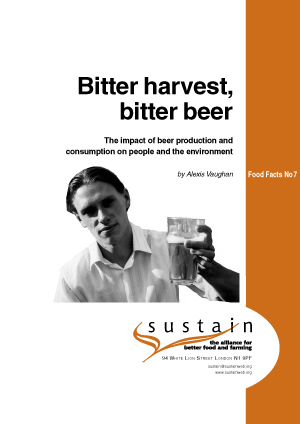
Bitter Harvest, Bitter Beer (Food Facts No. 7)
The impact of beer production and consumption on people and the environment (1999)
 This short summary of the report on beer, Bitter harvest, bitter beer, highlights the key issues and recommendations. The report is part of the Food Facts series, investigating growing concern about the environment and farming practices, and how our food production and distribution systems may be contributing to problems such as transport pollution, global warming and loss of wildlife.
This short summary of the report on beer, Bitter harvest, bitter beer, highlights the key issues and recommendations. The report is part of the Food Facts series, investigating growing concern about the environment and farming practices, and how our food production and distribution systems may be contributing to problems such as transport pollution, global warming and loss of wildlife.
Beer and the environment
Hops: The average farmer is estimated to spray hops up to 14 times each year with an average of 15 pesticide products. Hop fields also traditionally have a 'scorched-earth' appearance, to minimise weed growth (and hence wildlife) amongst the hops. Between 1987 and 1998 hop production declined by 42%, from 4,217 hectares to 2,447 hectares and, from self-sufficiency in 1989, home production is now only 70% of the total supply. Only 1 hectare (equivalent to 0.04% of the total hop area) is currently organic.
Barley and birds: Barley is produced in the UK mainly either for animal feed or for malting and distilling. There has been a dramatic decline in spring barley production from 69% to 22% in 20 years. This has contributed to the decline of the skylark (down by 58% since 1981) through removal of nesting and feeding sites. Winter barley is also treated more frequently with pesticides.
Organic beer: There are only three organic beers brewed in the UK. As both organic hops and barley can be grown in this country, it is surprising that brewers have not shown a greater interest. Organic beers may be a way for the smaller family and microbreweries to establish a market for their beers. This would also benefit the environment, increase consumer choice and create a more diverse brewing industry.
Beer miles and bottles: It has been calculated that the ingredients in locally brewed, locally drunk beer could, taken together, travel as little as 600 miles. A major brewer, exporting to the UK from, say, Germany, could accumulate 24,000 miles of transport for the ingredients and the product. Environmental costs could also be reduced if we followed the Danes’ example, where 99% of all glass bottles are re-used. Only about 2% of UK beer was sold in returnable bottles in 1997. And, despite years of campaigning, the labels on the bottles (and cans) still do not have to declare the ingredients in the beer, or declare alcohol content in a way that most people can understand.
Beer and the consumer: The UK government has estimated the cost of alcohol to the health, welfare and criminal justice services at around £10 billion per year. A recent study found that men drinking more than 11 pints a week were putting their health at significant risk, and those drinking more than 17 pints a week double their risk of an early death, compared to non-drinkers and moderate drinkers.
Since 1979, under European legislation, the additives and ingredients used to make drinks have to be declared on the label, but only if the drink contains less than 1.2% alcohol. Beer may contain many ingredients to improve the head on beers, increase shelf life and impart better colour and flavours. A few of the smaller breweries do list their ingredients.
The big and the small: In 1989 the six big brewers shared about 80% of the UK beer market. This monopoly of the market was supposed to improve following publication of the Monopolies Commission Report, called The Supply of Beer, but by 1998 four brewers dominated 83% of the market. Microbreweries have challenged the dominance of the big four companies, but still their market share of beer production remains under 2%. The typical microbrewery is either a stand alone unit producing between 1000 to 5000 barrels a year or a pub with a brewery attached. The major threat to the microbreweries is that the national breweries will further consolidate their market position by buying small and regional breweries and then closing them down.
Microbreweries and family and regional breweries also suffer in the beer market from having to paying the same level of duty on alcohol as the largest breweries. A Progressive Beer Duty (PBD), in which smaller breweries would pay less duty, would allow them to compete with the larger breweries, thereby creating more consumer choice, more jobs, and an increase in the diversity of beers manufactured. A PBD system has been in operation in Germany for many years, has also been introduced in the USA, and appears to be very successful in supporting small breweries. So far, the UK Government has refused to implement it, despite calculations showing the cost of such a tax would be only 0.05% of the current beer tax.
The report concludes with recommendations for consumers:
- Buy organic beer to show that there is a market for it.
- Buy beer in returnable bottles wherever you find them, and recycle any bottles and cans that cannot be returned.
- Sample locally produced beers at one of the many festivals up and down the country.
- Stay within the limits for sensible drinking and, when you do drink, make your choices count.
- Support the independent and small breweries by trying out their beers whenever you can.
- Ask for top-ups in pubs so that you get the full pint you paid for, and insist on good quality.
-
Write to your MP and ask them to put pressure on the Government to:
1. introduce a Progressive Beer Duty (PBD) to support small breweries,
2. champion legislation in Europe to introduce alcohol unit labelling and full ingredients listing, and
3. introduce legislation on returnable bottles, along the same lines as Denmark.
This work was supported by the DETR Environmental Action Fund
Food Facts: A series of short reports on over a dozen different products, shows how people's shopping choices - as well as government policy - can protect the environment, enhance social justice and improve health.
Sustain
The Green House
244-254 Cambridge Heath Road
London E2 9DA
020 3559 6777
sustain@sustainweb.org
Sustain advocates food and agriculture policies and practices that enhance the health and welfare of people and animals, improve the working and living environment, promote equity and enrich society and culture.
© Sustain 2026
Registered charity (no. 1018643)
Data privacy & cookies
Icons by Icons8
